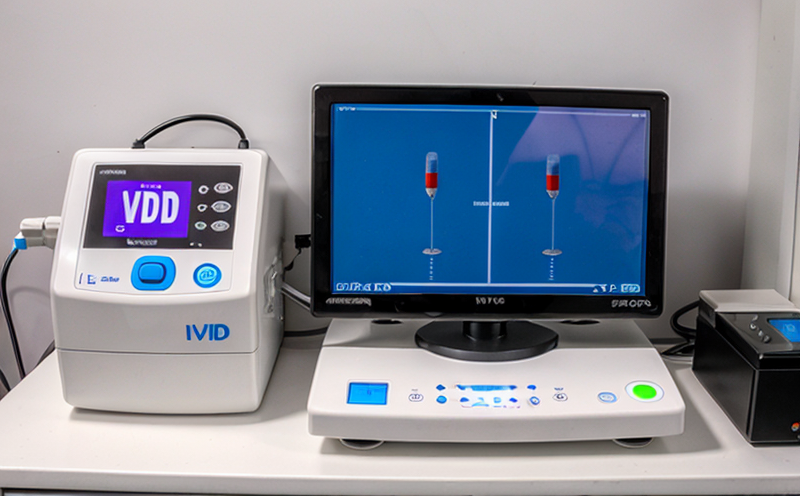Clinical Sensitivity Testing for IVD Devices
Understanding clinical sensitivity testing is crucial for ensuring that In Vitro Diagnostic (IVD) devices perform accurately and reliably. Clinical sensitivity, or the lower limit of detection (LLD), refers to the lowest amount of analyte in a specimen that can still be correctly identified by the diagnostic test. This parameter is essential because it directly impacts the accuracy and reliability of IVDs in diagnosing diseases.
For medical devices, clinical sensitivity testing ensures that the device can detect low levels of analytes accurately under specified conditions. This is particularly important for IVDs used in early-stage disease diagnosis or monitoring chronic conditions like diabetes or cancer. The testing process involves simulating real-world scenarios where the IVD must perform optimally to provide accurate results.
The test typically involves preparing dilutions of known concentrations of analytes and running them through the diagnostic device. The goal is to determine the lowest concentration that consistently produces a positive result, thereby establishing the clinical sensitivity. This ensures that the device can reliably detect even minimal amounts of the target analyte in patient samples.
International standards such as ISO 17895:2016 provide detailed guidance on conducting these tests. These standards ensure consistency and comparability across different laboratories, which is vital for regulatory compliance and ensuring that devices perform consistently worldwide.
The importance of clinical sensitivity testing cannot be overstated. It ensures that the IVD can reliably detect even small amounts of analytes, making it crucial for early disease detection and accurate monitoring. In many cases, timely diagnosis can significantly improve patient outcomes and treatment efficacy.
| Test Parameter | Specification |
|---|---|
| Sensitivity (Lower Limit of Detection) | Defined by the ISO 17895:2016 standard, typically expressed in units relevant to the analyte. |
| Type of Specimen | Blood, urine, or other body fluids as specified for the particular IVD. |
| Reagent Concentration | Diluted reagents are used to simulate varying concentrations in real-world conditions. |
| Instrumentation | Specifically calibrated diagnostic devices that meet ISO standards. |
The testing process is rigorous and involves multiple steps. Specimens are prepared with known concentrations of analytes, which are then run through the IVD device under controlled conditions. The results are analyzed to determine the lowest concentration at which the test consistently produces a positive result.
- Accurate specimen preparation
- Dilution series for varying concentrations
- Consistent reagent calibration
- Use of certified reference materials
- Data analysis and reporting
The results of clinical sensitivity testing are critical for the regulatory approval process. Regulatory authorities, such as the FDA or EMA, require this data to ensure that IVDs meet stringent performance standards.
In conclusion, clinical sensitivity testing is a cornerstone of ensuring the reliability and accuracy of IVD devices in medical applications. It plays a vital role in early disease detection and accurate monitoring, thereby enhancing patient outcomes and treatment efficacy. Compliance with international standards ensures consistent and reliable results across different laboratories and jurisdictions.
Benefits
Conducting clinical sensitivity testing offers several significant benefits to medical device manufacturers, quality managers, compliance officers, and R&D engineers:
- Improved Product Quality: Ensures that the IVD consistently detects analytes at the lowest possible concentration.
- Enhanced Regulatory Compliance: Data from these tests are essential for obtaining regulatory approvals.
- Patient Safety: By accurately detecting low levels of analytes, the device can provide early and accurate diagnoses.
- Consistency Across Laboratories: Following international standards ensures that results are consistent across different testing environments.
- Cost Savings: Early detection leads to more effective treatments, potentially reducing healthcare costs in the long term.
- Improved Patient Outcomes: Accurate and timely diagnosis can significantly improve patient outcomes.
The benefits of clinical sensitivity testing are clear. It ensures that IVDs perform reliably under real-world conditions, leading to improved patient care and more efficient healthcare systems.
Industry Applications
| Application Area | Description |
|---|---|
| Disease Diagnosis | Early detection and accurate diagnosis of diseases such as HIV, hepatitis, and diabetes. |
| Chronic Disease Management | Continuous monitoring of conditions like diabetes or heart disease to adjust treatment plans. |
| Infectious Disease Surveillance | Detection of infectious pathogens in blood or urine samples for timely interventions. |
| Point-of-Care Testing | Conducting tests at the point of care, such as in hospitals or clinics, to provide immediate results. |
Clinical sensitivity testing is widely used across various sectors. For instance, in infectious disease diagnosis, IVDs are crucial for early detection and treatment. In chronic disease management, continuous monitoring ensures that patients receive the appropriate care needed to manage their conditions effectively.
At our laboratory, we have extensive experience in conducting clinical sensitivity tests for a wide range of IVD devices used in these applications. Our expertise ensures that you can trust us with your testing needs, providing reliable data that meets stringent regulatory standards.
Customer Impact and Satisfaction
The impact of accurate clinical sensitivity testing extends beyond the laboratory to directly benefit patients and healthcare providers. By ensuring that IVDs can detect analytes at their lowest possible concentration, we contribute to early disease detection and more effective treatments.
- Patient Benefits: Early diagnosis leads to better treatment outcomes and improved patient quality of life.
- Hospital Impact: Reduced readmissions due to timely interventions and accurate monitoring.
- Provider Satisfaction: Accurate data helps providers make informed decisions, improving overall healthcare delivery.
We are committed to providing high-quality testing services that meet or exceed international standards. Our dedicated team of experts uses the latest technology and methodologies to ensure precision and reliability in every test we perform. Your satisfaction is our priority, and we strive to deliver results that not only comply with regulations but also enhance patient care.
We understand the importance of your time and resources. That’s why we offer efficient turnaround times and transparent communication throughout the testing process. Our goal is to make your experience as seamless and stress-free as possible, ensuring you receive accurate and actionable data promptly.





